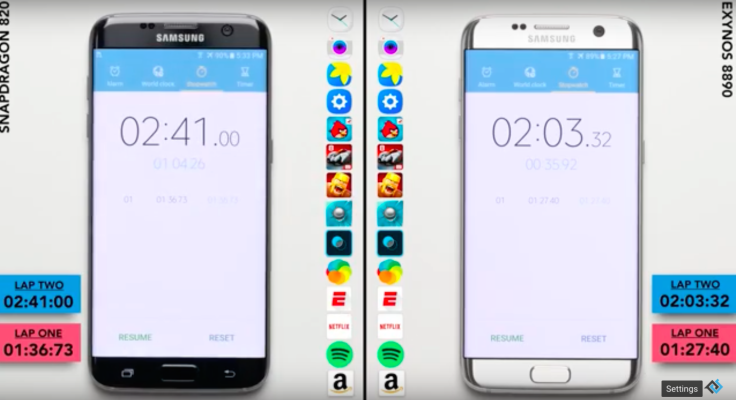The Samsung Galaxy S7 has gone up against many rival smartphones for performance tests. But now, enthusiasts are putting the Galaxy S7 up against itself. Testing team PhoneBuff has performed speed tests on the two processor models of the Galaxy S7, the Qualcomm Snapdragon 820 version and the Samsung Exynos 8890 version.
Speed tests are pretty commonplace at this point. Testers launch a device’s timer and go through several tasks, including launching large applications like games and websites in their desktop versions. PhoneBuff also tested the Snapdragon and Exynos Galaxy S7 models on their multitasking abilities, or how they performed with many high-processing applications open in the background.
The Samsung Galaxy S7 Exynos version came out victorious on all tests. In the the first round of testing application loading times, the Exynos model completed its tasks in one minute, 27 seconds, while the Snapdragon model took one minute, 36 seconds. In the second round, testing multitasking, the Exynos model pulled ahead even more, completing the entire test in two minutes, three seconds, while the Snapdragon Galaxy S7 took two minutes, 42 seconds to finish the full test.
Availability of the Snapdragon and Exynos models of the Galaxy S7 vary by market. North American customers will typically get the Snapdragon 820 model, while consumers in Asian, African, Middle Eastern and some European markets typically get the Exynos model. While Samsung says it selects Snapdragon chips to complement the processing ability of its own Exynos chips, it is pretty clear, at least from this test, that Samsung’s chip has some advantages.
In early March, tech enthusiast Jerome Ortega tested a Snapdragon model of the Galaxy S7 against the iPhone 6s Plus and several other Android devices. While the Galaxy S7 out performed its Android brethren, the iPhone 6s Plus beat the Galaxy S7 in a similar speed test. However, there remains to be a speed test against the iPhone 6s/6s Plus and the Exynos Galaxy S7.
The guys at PhoneBuff also noted that U.S. carrier models often have carrier bloatware, which can affect the performance of a smartphone. They tried to disable as much of bloatware as they could on the Snapdragon handset, which is an AT&T model, to make the tests as even as possible.

















